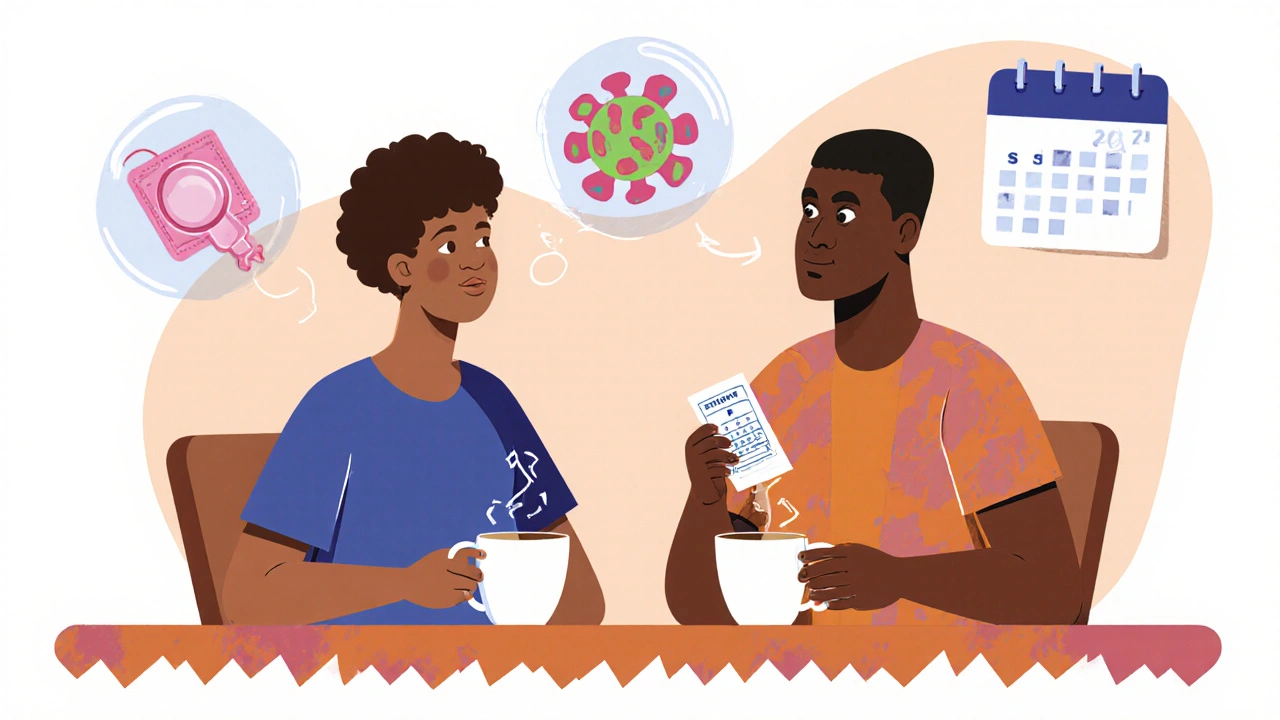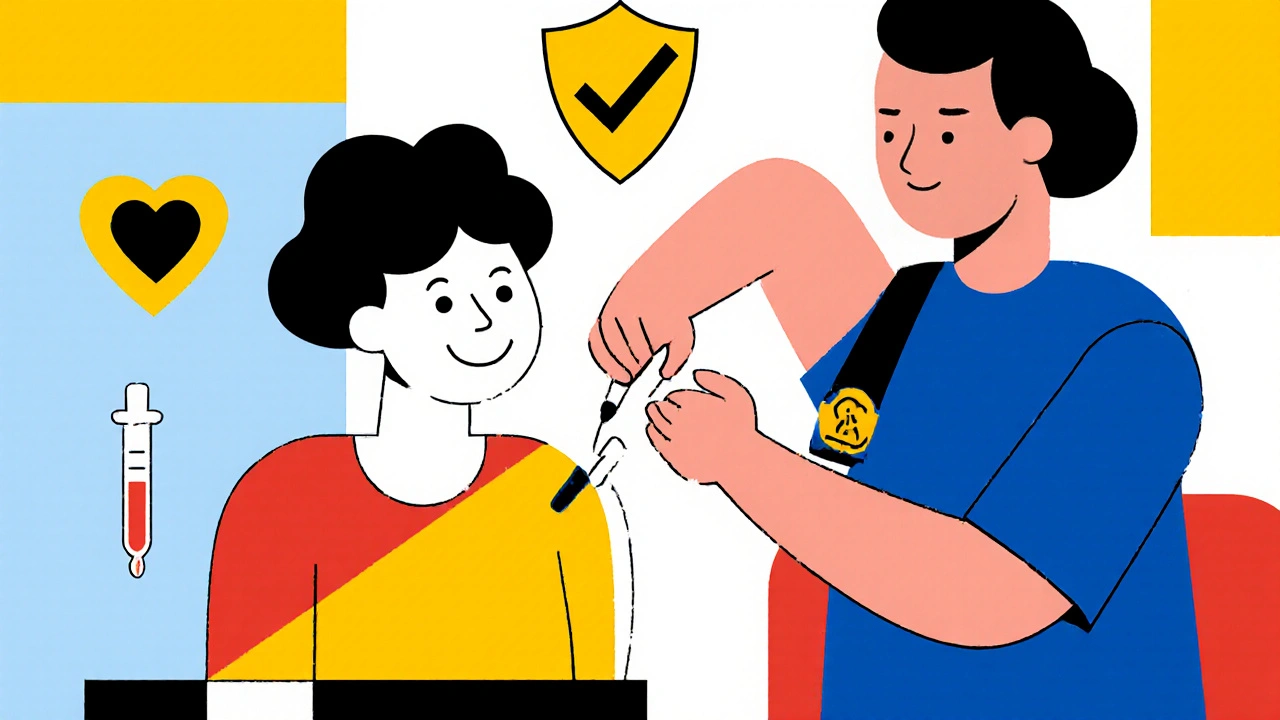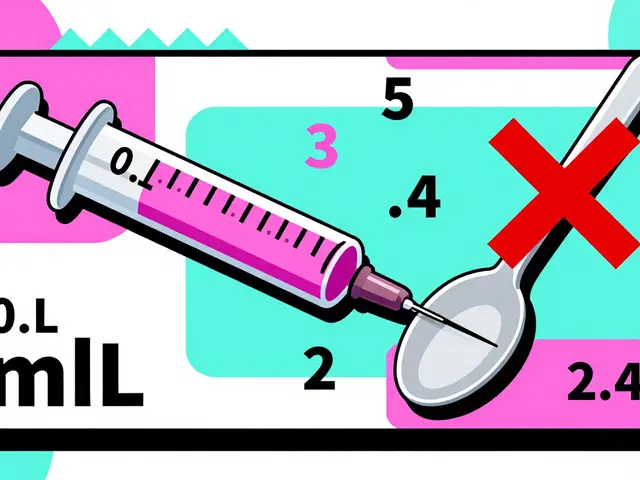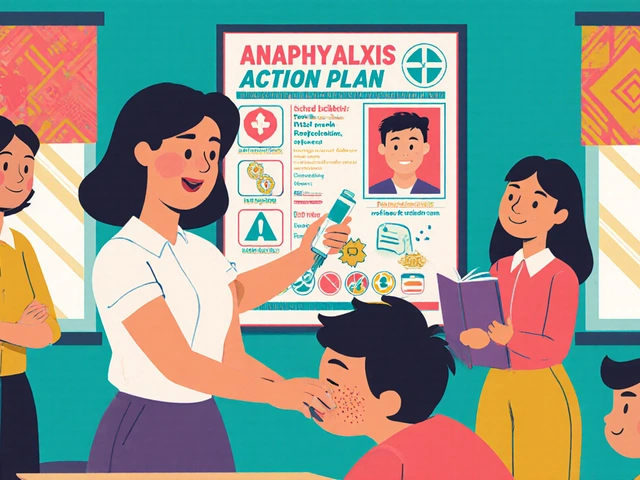Getting tested for syphilis isn’t just about checking a box-it’s one of the most direct ways to protect yourself and your partners. Many people think syphilis is a thing of the past, but it’s making a serious comeback. In the U.S. alone, cases have more than doubled since 2017, with over 176,000 reported in 2023. The good news? It’s easy to detect, easy to treat, and testing regularly is one of the smartest moves you can make for your sexual health.
Why Syphilis Testing Matters More Than You Think
Syphilis is tricky because it doesn’t always show symptoms right away. In its early stages, you might get a single sore-usually painless-that heals on its own. That’s it. No fever, no rash, no warning. But the infection is still there, silently spreading. Without testing, you could pass it to someone else without ever knowing.
By the time symptoms like rashes, swollen glands, or flu-like feelings show up, the infection has moved to the second stage. And if left untreated, syphilis can damage your heart, brain, nerves, and even lead to death. The Centers for Disease Control and Prevention (CDC) says syphilis is now the second most common bacterial STI in the U.S., after chlamydia. That’s why testing isn’t optional-it’s essential.
How Syphilis Testing Works
Getting tested is quick and simple. Most clinics use a blood test to look for antibodies your body makes to fight the syphilis bacteria. Some places offer a swab test if you have an active sore. Both methods are accurate, painless, and often free or low-cost at public health centers.
You don’t need to fast or prepare in any special way. Results usually come back in a few days. If the test is positive, treatment is straightforward: a single shot of penicillin for early-stage syphilis. More advanced cases might need more doses, but recovery is nearly 100% effective when caught early.
The Link Between Testing and Safe Sex
Safe sex isn’t just about condoms-it’s about knowing your status and your partner’s. Condoms reduce the risk of syphilis transmission, but they don’t eliminate it. The sore that spreads syphilis can appear on areas not covered by a condom, like the lips, scrotum, or anus. That’s why testing is the missing piece in the safe sex puzzle.
People who get tested regularly are more likely to:
- Have honest conversations with partners about STI history
- Use protection consistently, even if they feel healthy
- Get treated before symptoms worsen or spread to others
- Reduce anxiety around sexual activity by knowing their status
Testing creates a culture of responsibility. When you get tested, you’re not just protecting yourself-you’re helping break the chain of transmission. One person testing and treating syphilis can prevent dozens of new infections over time.

Who Should Get Tested and How Often
The CDC recommends:
- Everyone who is sexually active should get tested at least once
- People with multiple or new partners should get tested every 3 to 6 months
- Pregnant people should be tested during their first prenatal visit and again in the third trimester if at high risk
- Men who have sex with men should be tested at least annually, and every 3 months if they have multiple partners
- Anyone diagnosed with another STI should be tested for syphilis right away
If you’ve had unprotected sex, shared needles, or been told a partner has syphilis, get tested immediately. Don’t wait for symptoms. They might never come.
Myths That Keep People from Getting Tested
There are a lot of misunderstandings about syphilis testing:
- “I don’t need testing if I’m in a monogamous relationship.” Even in monogamous relationships, one partner could have been infected before the relationship started. Testing together is the only way to be sure.
- “It’s embarrassing to get tested.” Clinics see hundreds of people for STI testing every week. No one judges you. Your privacy is protected by law.
- “I’d know if I had it.” Up to 50% of early syphilis cases have no noticeable symptoms. You can’t rely on how you feel.
- “Only people with lots of partners get it.” Syphilis spreads through any unprotected sexual contact-even one time. It doesn’t care how many partners you’ve had.
These myths cost lives. They delay treatment, increase spread, and fuel stigma. The truth is simple: if you’re sexually active, you’re at risk. Testing removes the guesswork.
What Happens After a Positive Result
If your test comes back positive, don’t panic. Syphilis is curable. You’ll be connected with a provider who will give you antibiotics and explain how to avoid spreading it. You’ll need to avoid all sexual contact until treatment is complete and your provider says it’s safe.
Your partners also need to be tested and treated. Public health workers can help notify them anonymously-no names needed. This protects your privacy while keeping everyone safe.
After treatment, you’ll need follow-up blood tests to make sure the infection is gone. It can take months for antibodies to drop, so regular check-ins are key.

Where to Get Tested
You don’t need a doctor’s appointment to get tested. Many options are available:
- Local health departments-often free and confidential
- Planned Parenthood clinics-offer sliding-scale pricing
- Urgent care centers and urgent care clinics
- At-home test kits-available online (though blood tests are still more accurate)
- Some pharmacies and community events offer free testing days
Call ahead or check your local health department’s website. Most places don’t require insurance. You can walk in without an appointment.
How Testing Changes the Way You Have Sex
People who test regularly report feeling more in control of their sex lives. They talk to partners more openly. They choose protection more consistently. They feel less fear and shame.
Testing doesn’t make sex less exciting-it makes it safer and more honest. Imagine having a conversation with a new partner: “I got tested last month. Here’s my result. What about you?” That’s not awkward. That’s responsible. That’s how healthy relationships are built.
When you test, you’re choosing trust over fear. You’re choosing clarity over guesswork. And you’re choosing to be part of the solution-not part of the problem.
Final Thought: Testing Is an Act of Care
Syphilis testing isn’t a punishment or a sign you did something wrong. It’s a routine health check-like getting your blood pressure checked or your teeth cleaned. It’s a way to take care of your body, your partners, and your future.
One test can save you from years of complications. One test can protect someone you love. One test can stop the spread before it starts.
Don’t wait for symptoms. Don’t wait for a crisis. Get tested. Then do it again. Your body-and the people around you-will thank you.
Can you get syphilis from kissing?
Yes, if there’s an active sore in the mouth or on the lips. Syphilis spreads through direct contact with a sore, which can appear anywhere-including the mouth. Kissing someone with an undiagnosed syphilis sore can transmit the infection, even if there’s no penetration or sexual contact.
How long does it take for syphilis to show up on a test?
It usually takes 3 to 6 weeks after exposure for your body to produce enough antibodies for a blood test to detect syphilis. If you think you’ve been exposed, wait at least 4 weeks before testing. If the first test is negative but you still have symptoms or risk factors, get tested again after 3 months.
Can you get syphilis more than once?
Yes. Having syphilis once doesn’t make you immune. You can get infected again-even after successful treatment. That’s why regular testing and consistent safe sex practices are essential, even after you’ve been treated.
Does syphilis testing hurt?
Not at all. A blood test is just a quick needle stick, similar to a routine blood draw. If you have a sore, a swab might be used-this feels like a gentle cotton swab across the skin. Most people say it’s less uncomfortable than a flu shot.
Is syphilis testing confidential?
Yes. By law, all STI test results are private. Clinics can’t share your results with employers, family, or partners without your permission. Some places offer anonymous testing where you don’t even need to give your name. Your privacy is protected.
Can I test myself at home?
At-home syphilis test kits are available online and use a finger-prick blood sample. They’re convenient but less accurate than lab tests. If your home test is positive, you must go to a clinic for confirmation and treatment. Negative results from home tests should still be followed up with a lab test if you have symptoms or high risk.



November 20, 2025 AT 16:33 PM
Just got tested last week-turns out I’m clean, but I didn’t realize how much anxiety I was carrying until it was gone. Feels weird to say this, but getting tested was kinda empowering? Like, I’m not scared of my body anymore. Also, the nurse gave me a sticker. Small wins, you know?
November 21, 2025 AT 08:47 AM
Let me guess-you all think syphilis is some ancient plague that only happens to people who party in the 90s? Newsflash: it’s back, and it’s not discriminating. I had a friend get it from a one-night stand where the condom slipped. He didn’t even know he had a sore on his lip. No fever. No drama. Just… a silent little time bomb. And now he’s got to tell five people. Don’t be that guy. Get tested. It’s not a moral failing. It’s basic hygiene, like washing your hands after using the bathroom.
November 21, 2025 AT 10:03 AM
Y’all are making this way too complicated. Syphilis isn’t a moral test. It’s a medical one. You want to have sex? Cool. But if you’re not testing, you’re just gambling with someone else’s health. And guess what? That’s not sexy. That’s selfish. Get the blood test. Get the shot. Move on. No drama. No guilt. Just responsibility. Simple as that. Stop turning it into a trauma narrative. It’s a bacteria. Not a character arc.
November 22, 2025 AT 15:38 PM
I’ve been getting tested every 90 days since 2020, and honestly? It’s the most consistent thing in my life. I don’t even think about it anymore-it’s just part of my routine, like brushing my teeth or changing my sheets. And you know what? It’s made my relationships better. No more guessing games. No more ‘did they say they were clean?’ I just say, ‘Here’s my result, what’s yours?’ And it’s not awkward. It’s refreshing. People are way more honest when there’s no shame attached. We need to normalize this. Like, imagine if everyone did this. We could wipe out syphilis in a decade. It’s not sci-fi. It’s science.
November 24, 2025 AT 05:36 AM
Let’s be brutally honest: most people who get tested do it because they’re terrified they’ve done something wrong. That’s not empowerment. That’s guilt-driven behavior. Syphilis isn’t a villain. It’s a biological inevitability in a sexually active species. The real issue is the cultural shame that turns a simple medical procedure into a confession booth. You’re not a bad person for having it. You’re a bad person for pretending you’re immune to risk. Stop romanticizing testing. Just do it. Because you’re mortal. Not special.
November 25, 2025 AT 10:49 AM
Wow. A whole essay on syphilis testing. And I thought my last text to my ex was dramatic.
November 25, 2025 AT 13:35 PM
According to the CDC guidelines, individuals who are sexually active should undergo testing at least once in their lifetime; however, those with multiple or new partners require testing every three to six months. Additionally, pregnant individuals must be tested during the first trimester and again in the third trimester if they are at high risk. Men who have sex with men should be tested annually, with more frequent testing if multiple partners are involved. Furthermore, anyone diagnosed with another STI should be tested for syphilis immediately. These recommendations are evidence-based and should be followed without exception.
November 25, 2025 AT 15:12 PM
Everyone’s acting like syphilis is the apocalypse. It’s a treatable infection. The real problem is that people are too lazy to use condoms properly or have one conversation with a partner before getting naked. Testing doesn’t fix bad habits. It just covers them up. You don’t need a blood test to be responsible-you need a brain. Stop treating this like a public health miracle. It’s a band-aid on a bullet wound.
November 26, 2025 AT 16:40 PM
I get where the original post is coming from, and I appreciate the tone. But I think we’re missing something bigger: access. Not everyone can walk into a clinic and get tested. Some people don’t have transportation. Others are undocumented. Some live in areas with zero public health resources. Testing is great-but if you don’t have access to it, it’s just a slogan. We need more mobile clinics, more funding, more outreach. It’s not just about personal responsibility. It’s about systemic care. And if we’re serious about ending syphilis, we need to fix the system, not just shame the individual.
November 27, 2025 AT 02:41 AM
I just got my results back… negative. And I cried. Not because I was scared-I was just so tired of carrying that weight. I’ve been single for a year, and every time I met someone new, I’d lie awake wondering if I’d passed something on without knowing. I didn’t tell anyone I was getting tested. Not even my therapist. But today, I texted my best friend: ‘I’m clean.’ She replied with a single heart emoji. And for the first time in years… I felt free. Thank you for writing this. It’s not just facts. It’s hope.